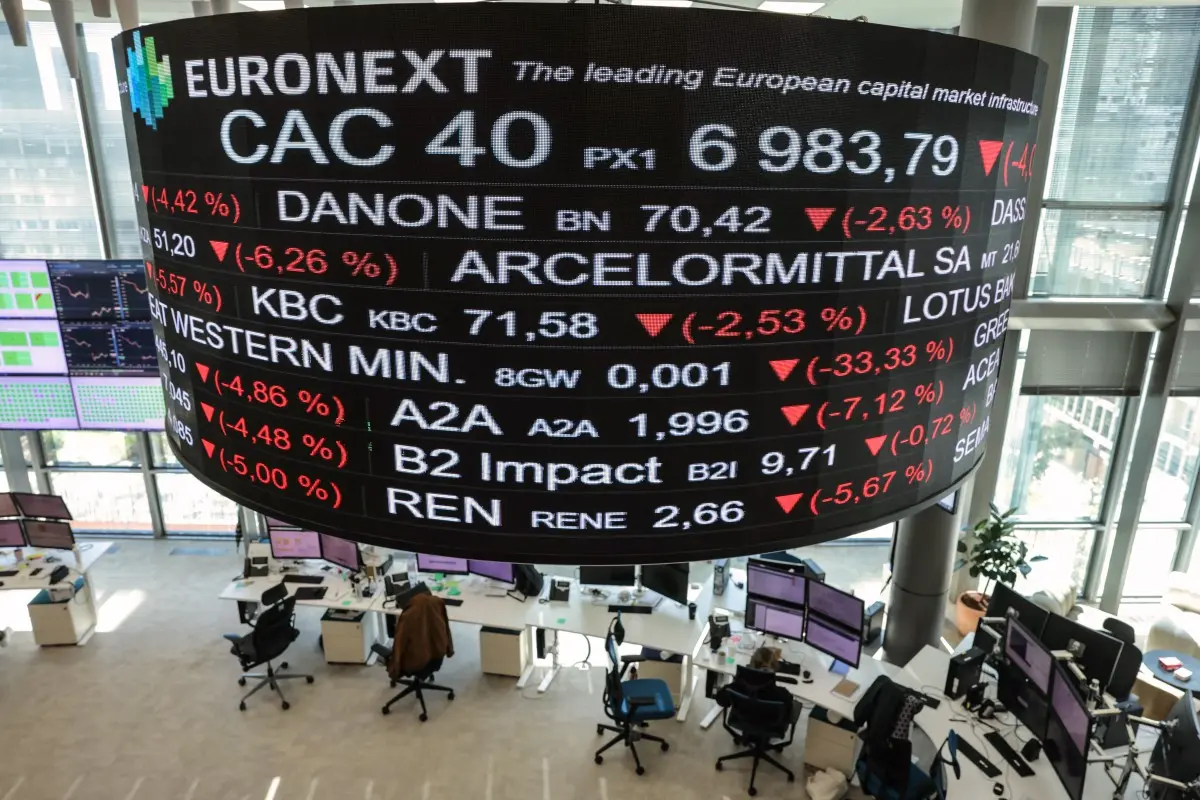
Global stock markets fell sharply on Friday after U.S. President Donald Trump threatened to impose “massive” new tariffs on China, while oil prices retreated as tensions in the Middle East eased following a ceasefire in Gaza.
Trump accused Beijing of engaging in “hostile trade practices,” including the introduction of new export controls on rare earth materials, and warned that further punitive measures were under consideration. He also said he no longer saw the need to meet Chinese President Xi Jinping at a summit later this month.
The president’s remarks triggered an immediate selloff on Wall Street, where the Nasdaq tumbled 2 percent by late morning, while the S&P 500 and Dow Jones Industrial Average also posted steep losses. The U.S. dollar weakened against major global currencies.
Market optimism fades after weeks of record highs
Until Trump’s comments, investors had been riding a wave of optimism driven by record-breaking performances across several markets. The Nasdaq, Frankfurt DAX, and gold prices all reached new highs earlier in the week, while silver climbed to levels not seen in decades.
Analysts said the renewed trade tensions risk derailing a fragile recovery in global trade relations that had seen Washington and Beijing move toward easing their tariff standoff.
China on Thursday had announced new rules restricting exports of rare-earth technologies materials essential to industries from semiconductors to electric vehicles adding another flashpoint to the already strained U.S.–China relationship.
Oil slides as Gaza ceasefire calms markets
Oil prices also retreated more than 3 percent as traders reacted to the Gaza ceasefire, which helped ease fears of a broader regional conflict that could disrupt global energy supplies.
The U.S. benchmark West Texas Intermediate (WTI) dropped below $60 per barrel, closing at $59.45, while Brent crude settled at $63.20 per barrel.
Analysts said Trump’s latest trade threat compounded the downward pressure, as escalating tariffs could dampen global demand for energy and slow economic activity.
European and Asian markets follow Wall Street lower
Major European indices mirrored the slump, with Paris’s CAC 40 and Frankfurt’s DAX both down 1.5 percent, and London’s FTSE 100 off 0.9 percent. In Asia, Tokyo’s Nikkei 225 shed 1.0 percent, Hong Kong’s Hang Seng dropped 1.7 percent, and Shanghai’s Composite Index fell 0.9 percent.
French markets were also under pressure ahead of President Emmanuel Macron’s expected announcement of a new prime minister to lead efforts out of the country’s ongoing political crisis.
AI boom fuels earlier rally but bubble fears persist
The earlier surge in global equities was fuelled by massive investments in artificial intelligence (AI) technology. News that OpenAI, maker of ChatGPT, had signed multi-billion-dollar chip deals with AMD, Samsung, and SK hynix sparked further investor enthusiasm, pushing Nvidia’s market capitalization past $4 trillion.
However, analysts warned that the relentless rally in AI-related stocks may be losing steam.
“The AI bubble debate remains a hot topic,” said Ipek Ozkardeskaya, senior analyst at Swissquote Bank. “Some see it as the next internet bubble 2.0 waiting to burst, while others believe it still has room to expand.”
These uncertainties have driven investors toward safe-haven assets, sending gold prices soaring above $4,000 per ounce earlier in the week.
Key Market Figures (as of 1530 GMT)
- Dow Jones: ↓ 1.0% at 45,900.22
- S&P 500: ↓ 1.4% at 6,640.18
- Nasdaq Composite: ↓ 2.0% at 22,563.26
- FTSE 100 (London): ↓ 0.9% at 9,427.47
- CAC 40 (Paris): ↓ 1.5% at 7,918.00
- DAX (Frankfurt): ↓ 1.5% at 24,241.46
- Nikkei 225 (Tokyo): ↓ 1.0% at 48,088.80
- Hang Seng (Hong Kong): ↓ 1.7% at 26,290.32
- Shanghai Composite: ↓ 0.9% at 3,897.03
Currencies:
- Euro/Dollar: ↑ to $1.1628 (from $1.1558)
- Pound/Dollar: ↑ to $1.3357 (from $1.3294)
- Dollar/Yen: ↓ to ¥151.62 (from ¥153.14)
- Euro/Pound: ↑ to £0.8706 (from £0.8694)
Commodities:
- Brent Crude: ↓ 3.1% at $63.20
- WTI Crude: ↓ 3.1% at $59.45



